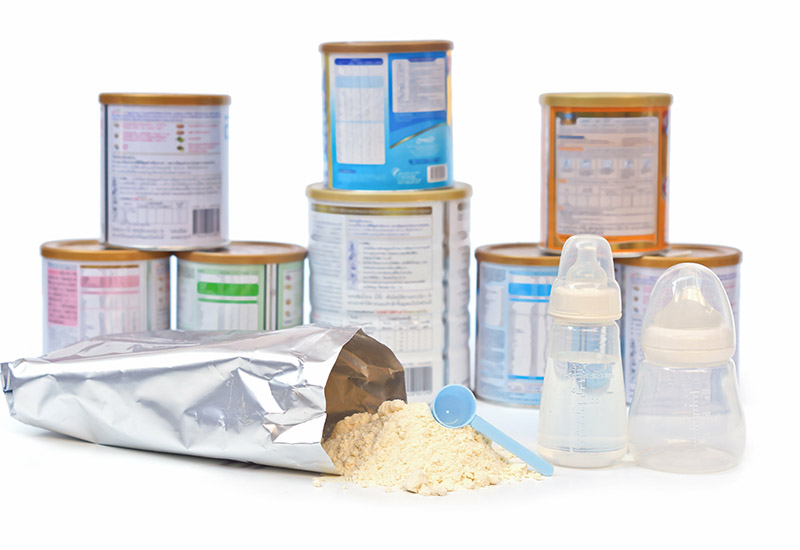Infant Formula Updates
Special Notice
Effective March 1st 2023, DC WIC is back to issuing Similac standard infant formula products: Similac Advance, Similac Sensitive and Similac Isomil. During the formula shortage, DC WIC received approvals from the United State Department of Agriculture Food and Nutrition Service and our formula contractor, Abbott Laboratories that allowed temporary formula substitutions. Currently, inventory for the standard formula products is healthy in the DC region. The expiration of the approvals is nationwide. As before, DC WIC will continue to provide specialty formula from its approved formulary list for participants with medical needs.
For more information, contact DC WIC at info.wic@dc.gov or visit www.dcwic.org.
Formula Shortage-Guide for Pediatricians
This web page addresses the national infant formula shortage and how pediatricians can provide support and guidance to families on feeding babies and to ensure access to lactation support.
Families are anxious about safely feeding their babies during the national formula shortage. Many formula brands are out of stock in stores around the country with some communities being more affected than others. As a result, parents are seeking guidance and support from pediatricians to help them navigate the formula shortage crisis.

Parent Tip Sheet
To assist the pediatrician and families during the formula shortage, the DC Breastfeeding Coalition has developed a “Parent tip sheet” on how families can safely feed their babies. Information is provided for breastfeeding parents who are seeking guidance to increase human milk feedings. The handout is a compilation of the recommendations from American Academy of Pediatrics (AAP), Department of Health and Human Services (DHHS), Center for Disease Control and Prevention (CDC), Academy of Breastfeeding Medicine (ABM), International Lactation Consultant Association (ILCA), and The Special Supplemental Nutrition Program for Women, Infant, and Children (WIC).
Breastfeeding Support
The DC Breastfeeding Coalition urges pediatricians to support food security through initiation and continuation of breastfeeding that includes ensuring access to lactation support, breast pumps and supplies, and donor milk. Pediatricians can inform parents of the following community resources for lactation support which is essential for breastfeeding success and duration.
- Free lactation support at the Children’s Health East of the River Lactation Center; provides in-person and virtual lactation support and various other services.
- Breastfeeding support is provided for DC WIC participants from peer counselors and certified lactation consultants through in-person, virtual consultations, and group classes. DC WIC offers free access to video visits with a certified lactation consultant 24/7 through the Pacify app.
Additional Community Resources
- DC WIC
- DC Breastfeeding Coalition
- The Breastfeeding Center of Greater Washington
- East of the River Lactation Center
- Metropolitan Breastfeeding
- Mamatoto Village
- The National Breastfeeding Support Center at Howard University Hospital 202-865-1316
- Find a Lactation consultant
- Find an accredited milk bank
Advocating for Lactation Policies
Solutions to major policy gaps in lactation are needed to provide the support parents need to reach their breastfeeding goals. Advocating for lactation support policies can influence policy makers to act and invest in infant food security through breastfeeding so that we can avoid another formula shortage crisis in the future.
Two policies that are pending in Congress would make a difference for breastfeeding families. Show your support for breastfeeding families through advocating for these policies.
Establish a national paid family and medical leave program. The FAMILY Act (S. 248/H.R. 804) would ensure that families have time to recover from childbirth and establish a strong breastfeeding relationship before returning to work.
Ensure all breastfeeding workers have time and space to pump during the workday. The Providing Urgent Maternal Protections (PUMP) Act (S. 1658/H.R. 3110) would close gaps in the Break Time for Nursing Mothers Law, giving 9 million more workers time and space to pump.
More information on advocating for policy through the U.S. Breastfeeding Committee website.
For Parents
Baby Formula Shortage 2022: Tips for Parents to Safely Feed Babies

The National formula shortage has many families feeling anxious about how to safely feed their babies.
Many formula brands are out of stock in stores around the country with some communities being more affected than others. The American Academy of Pediatrics recommends only human milk or formula for babies until 12 months and to add solid foods around 6 months.
Pediatricians and other health care providers can provide support and guidance to families on how to safely feed their babies.
6 Tips to Feed Your Baby Safely
To help parents safely navigate the formula shortage crisis, the information provided are recommendations from the American Academy of Pediatrics (AAP), Department of Health and Human Services (DHHS), Center for Disease Control and Prevention (CDC), Academy of Breastfeeding Medicine (ABM), International Lactation Consultant Association (ILCA), and The Special Supplemental Nutrition Program for Women, Infant, and Children (WIC).
Use generic brand name formulas
- If you can’t find your baby’s formula, try store-brand formula that is like your baby’s usual formula from CVS, Walmart, Target, or other reputable retailers. Call your health care provider if your baby is not tolerating the new formula well.
- Store brands don’t make special formulas. If your baby is on a special formula because of a medical problem, talk to your pediatrician or other health care provider about safe, comparable specialty formulas.
- DC WIC or local food banks can provide other brands of baby formula and ready-to-feed formula.
- If your child is older than 6 months and on regular formula, cow’s milk may be given for up to 1 week if you cannot find any formula. Some pediatricians would recommend you wait until your child is at least 9 months old. Long term use of cow’s milk is not safe since it can lead to low iron in the blood which can affect the baby’s development. Talk with your health care provider before starting cow’s milk.
Avoid unsafe formula practices
- Do not add extra water to the formula. This can dilute the nutrients and lead to low sodium levels in the blood and other serious health problems.
- Don’t make homemade baby formula or use evaporated milk. It has risks for contamination and incorrect balance of nutrients that can harm your baby.
- Don’t use solid foods to stretch formula supply if your baby is less than 6 months old. Talk with your pediatrician or health care provider before giving your baby solid foods.
- Don’t give cow’s milk substitutes such as soy, almond, or oat milk. It lacks the right amount of nutrients.
- Don’t give goat’s milk. It is not approved for babies in the U.S.
- Don’t give toddler formula to babies under 1 year. The AAP warns against its use. It doesn’t provide the right nutrients for infant growth. If there are no other choices, it can be used for babies close to 12 months for a few days.
- Don’t buy more formula than you need for a 10 day to 2-week supply to help ease the lack of supplies in the stores.
Caution when buying formula online
- Trusted social media sites and parent groups can help you find available formula.
- Avoid buying formula online from sources you are unfamiliar with or at auction sites. It could be a fake product.
- The AAP warns against buying online formula overseas. It is not regulated by the FDA.
- Currently, formula from foreign countries is being imported to the US to help with the shortage.
If you are pregnant, have a newborn or recently stopped feeding your baby human milk
- Consider the health benefits of human milk and potential risks of formula feeding and challenges with shortages when making the decision on how to feed your baby.
- Seek prenatal education and connect with a health care provider who is supportive of human milk feeding to help you make an informed decision.
- If you are not giving your baby any human milk, consider re-lactating to build back up your milk supply. This process can be difficult the further out you are from birth. Seek a skilled lactation consultant if you plan to re-lactate.
- Consider pasteurized donor human milk from a certified human milk bank. This option may be costly, and availability is often restricted to babies in medical need.
If you are partially breastfeeding consider these options
- Transition back to full breastfeeding to use less baby formula. Seek a lactation consultant who can help you increase your supply. Careful monitoring of your baby’s growth will be necessary as you gradually increase your milk supply.
- Pasteurized donor human milk from a certified human milk bank. This option may be costly, and availability is often restricted to babies in medical need.
- The AAP warns against informal milk sharing due to safety risks while the ABM urges families to carefully consider safety and to follow their guidelines if using human milk other than their own. Seek out a lactation consultant to help you with this process.
- Don’t purchase human milk from the internet or from any source you don’t know and trust. Seek out a lactation consultant to help you.
- If your premature baby is using formula to fortify human milk, talk with your provider to see if you need to continue.
- When feeding, place only the amount the baby will eat to not waste any of your human milk supply.
If you are exclusively breastfeeding
Consider donating your excess milk to a local milk bank that is certified by the Human Milk Banking Association of North America (HMBANA).

Resources
More information on formula shortage
- American Academy of Pediatrics
- Academy of Breastfeeding Medicine
- Centers for Disease Control and Prevention
- Department of Health and Human Services
- USDA Food and Nutrition Service; WIC
- WIC Formula Waivers
- International Lactation Consultant Association
- USBC
- Advocacy Letter to Congress on Formula shortage
- Abbott formula powder recall updates
Community Resources
- DC WIC
- DC Breastfeeding Coalition Resource Guide
- The Breastfeeding Center of Greater Washington
- East of the River Lactation Center (free services)
- Metropolitan Breastfeeding
- Mamatoto Village
- The National Breastfeeding Support Center
at Howard University Hospital. 202-865-1316 - Pacify app provides 24/7 lactation support services
- Find a Lactation consultant
- Find an accredited milk bank